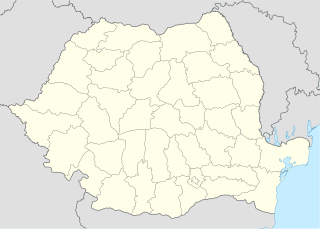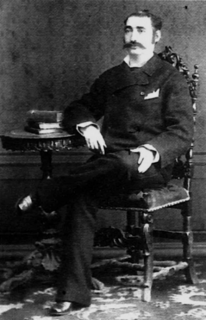
The Cișmigiu Gardens or Cișmigiu Park are a public park near the center of Bucharest, Romania, spanning areas on all sides of an artificial lake. The gardens' creation was an important moment in the history of Bucharest. They form the oldest and, at 16 hectares, the largest park in city's central area. The main entrance is from Regina Elisabeta Boulevard, in front of the City Hall; there is another major entrance at the Știrbei Vodă Street, near the Crețulescu Palace. The southwestern corner of the park is adjacent to the Gheorghe Lazăr High School.

Ion Luca Caragiale was a Wallachian, later Romanian playwright, short story writer, poet, theater manager, political commentator and journalist. Leaving behind an important cultural legacy, he is considered one of the greatest playwrights in Romanian language and literature, as well as one of its most important writers and a leading representative of local humor. Alongside Mihai Eminescu, Ioan Slavici and Ion Creangă, he is seen as one of the main representatives of Junimea, an influential literary society with which he nonetheless parted during the second half of his life. His work, spanning four decades, covers the ground between Neoclassicism, Realism, and Naturalism, building on an original synthesis of foreign and local influences.

Radu Beligan was a Romanian actor, director, and essayist, with an activity of over 70 years in theater, film, television, and radio. On 15 December 2013, confirmed by Guinness World Records, the actor received the title of "The oldest active theatre actor" on the planet. He was elected honorary member of the Romanian Academy in 2004.

Mateiu Ion Caragiale was a Romanian poet and prose writer, best known for his novel Craii de Curtea-Veche, which portrays the milieu of boyar descendants before and after World War I. Caragiale's style, associated with Symbolism, the Decadent movement of the fin de siècle, and early modernism, was an original element in the Romanian literature of the interwar period. In other late contributions, Caragiale pioneered detective fiction locally, but there is disagreement over whether his work in the field produced a complete narrative or just fragments. The scarcity of writings he left is contrasted by their critical acclaim and a large, mostly posthumous, following, commonly known as mateists.

Costache Caragiale was a Romanian actor and theatre manager who had an important role in the development of the Romanian theatre.

The National Theatre Bucharest is one of the national theatres of Romania, located in the capital city of Bucharest.

Mitică is a fictional character who appears in several sketch stories by Romanian writer Ion Luca Caragiale. The character's name is a common hypocoristic form of Dumitru or Dimitrie. He is one of the best-known figures in Caragiale's 1901 collection Momente şi schiţe, as well as in Romanian humor at large. Mitică is a male resident of Bucharest whose background and status are not always clear, generally seen as an allegory of the average Bucharester or through extension, inhabitants of Romania's southern regions—Wallachia and Muntenia. According to accounts, he was based on a resident of Sinaia, whom Caragiale had befriended.

I. L. Caragiale is a commune in Dâmbovița County, Romania. Known as Haimanale until 1952, it was the birthplace of Ion Luca Caragiale. The commune is composed of three villages: Ghirdoveni, I. L. Caragiale and Mija.

The one hundred lei banknote is one of the circulating denomination of the Romanian leu. It is the same size as the 100 Euro banknote.
The National University of Theatre and Film "I.L.Caragiale" Bucharest (UNATC) is a public university in Bucharest, Romania, founded in 1954. It is named in honor of Ion Luca Caragiale.
Caragiale is a surname in Romania, associated with several members of a theatrical and literary family:

Luca Ion Caragiale was a Romanian poet, novelist and translator, whose contributions were a synthesis of Symbolism, Parnassianism and modernist literature. His career, cut short by pneumonia, mostly produced lyric poetry with cosmopolitan characteristics, distinct preferences for neologisms and archaisms, and willing treatment of kitsch as a poetic subject. These subjects were explored in various poetic forms, ranging from the conventionalism of formes fixes, some of which were by then obsolete, to the rebellious adoption of free verse. His poetry earned posthumous critical attention and was ultimately collected in a 1972 edition, but sparked debates among literary historians about the author's contextual importance.
Silvian Iosifescu was a literary critic, educator, translator and Romanian literature professor at the Faculty of Letters, University of Bucharest. He was head of literary theory at the university.
O scrisoare pierdută is a play by Ion Luca Caragiale. It premiered in 1884, and arguably represents the high point of his career.

Mofturi 1900 is a 1964 Romanian comedic film directed by Jean Georgescu and based on Ion Luca Caragiale's many Moments and Sketches. The sketches used are "Diplomatie" ("Diplomacy"), "Amicii" ("Pals"), "O lacuna", "Bubico", "C.F.R." and "Din statiune". The film stars Grigore Vasiliu Birlic, Iurie Darie and Ion Dichiseanu; and features Ioana Bulcă, Alexandru Giugaru, Mircea Crisan, Geo Barton and others. Set at the beginning of the 20th century, the story revolves around two Mitică characters sitting at a cafe telling stories to each other.

Zoe Băicoianu was a Romanian sculptor and ceramist.

Mișu or Mihail Ion Văcărescu, most commonly known as Claymoor, was a Wallachian, later Romanian fashion journalist and gossip columnist, the son of poet Iancu Văcărescu. A retired cavalry officer in the Romanian Land Forces, he began writing in his late twenties or early thirties, reaching his fame as a contributor to the Francophone daily L'Indépendence Roumaine. He was widely respected for his verdicts on fashion, and, as an arbiter of taste, contributed to his paper's renown; however, people of his day also ridiculed him for his florid literary style, his political involvement with the Conservative Party, and his apparent homosexuality.
Bogdan Ștefan Ghiță Ulmu, known as Bogdan Ulmu, was a Romanian theatre director, writer, and opinion journalist.
A Lost Letter is a 1953 Romanian historical comedy film directed by Sica Alexandrescu and Victor Iliu. It is based on the 1884 play A Lost Letter by Ion Luca Caragiale. A compromising love letter that goes astray threatens to cause a scandal in a small provincial town in the late nineteenth century.

Adina Pintilie is a Romanian film director and screenwriter. Her debut film Touch Me Not was awarded the Golden Bear at the 68th Berlin International Film Festival.















